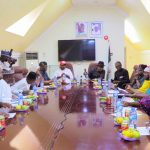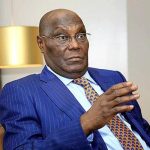By Edwin Philip
The place of social dialogue in engendering sustainable development has been flagged as a major tool for the quality of legislative functions in a democracy.
Legal practioner and advocate of justice for all Mrs Gloria Mabiem Ballason said legislative workers should promote social Dialogue in the course of their work and interaction with their employers, the system and among themselves as critical stakeholders in the promotion of democratic governance in the country.
In a Keynote address at the National workshop of the Parliamentary Staff Association of Nigeria held in Abuja recently, Gloria Mabeiam Ballason Esq who is also the Chief Executive Officer of House of Justice drew a case study of the International Labour Organisation (ILO) which puts language to social interaction to mean all types of negotiation, consultation or simply exchange of information between or among, representatives of governments, employers and workers on issues of common interest relating to economic and social policy, as the interaction can exist as a tripartite process with the government as an official party to the dialogue or it may be bipartite relations only between labour and management or between trade unions and employers’ organizations.
She argued that through social dialogue, individuals are able to exchange ideas, express opinions and engage diverse perspectives leading to increased awareness, empathy and cooperation for the building of a more inclusive and cohesive society where mutual respect and understanding thrive.
According to her, Europe had a head start in the practice of tripartism between governments and the representative organizations of workers and employers within and across borders.They find social dialogue relevant in achieving solutions and to building up social cohesion and the rule of law through, among other means, international labor standards quoting.
America’s monumental cultural poet, Henry Wadsworth, that “a single conversation across the table with a wise person is better than ten years of book study.”
“I imagine that this reasoning, being extended to social dialogue with workers in the parliamentary space will not only allow for ideas and critical thinking that enables us reach common grounds and democratic developments, but it also has the potential to enable us find solutions that are just and sustainable, If it is true that questions tell us more than answers ever will- as I think it is, then we must pause to ask: Why Social Dialogue”? She asked.
Ballason added that if any one thinks that talk is cheap , he or she should try its absence in governance, suggesting that It is safe to establish that to have the right governance or to build development that is sustainable, having different perspectives must be normalized, encouraged and welcome, as anything outside that is an aberration.
Undertaking a comparative analysis of how Social Dialogue works in other climes, in countries like Sweden, South Africa, Norway, Denmark, the Philippines and Indonesia that have effectively utilized social dialogue to address various challenges and promote social cohesion, Sweden for example, Social Dialogue is said to be instrumental in resolving labour disputes and fostering cooperation between employers and employees.
Whereas in South Africa, social dialogue played a crucial role in the transition from apartheid to multi party democracy, facilitating reconciliation and nation-building efforts. Further, she explained that Norway and Denmark have effectively utilized social dialogue to address gender equality and work-life balance challenges while the Philippines stands out as the first Asian country to effectively leverage social dialogue to address societal issues and promote harmony within its community.
Similarly, she explained that Indonesia deployed social dialogue achievement through the significant increase in minimum wage as a result of which all major industrial cities increased minimum wages above 100% with the objective of gradually shifting the economy from low cost labour to a skilled workforce.
She went on to say that these examples highlight the power of social dialogue in tackling diverse problems and advancing societal progress, delving into the realm if putting data and indices to development emphasising that Individuals, organizations, countries even the United Nations in September, 2015, world leaders adopted 17 Sustainable Development Goals (SDGs) and by 1 January 2016, a 15-year road map made up of 17 goals was globally activated as the template by which development would be measured.
The 17 SDGs include: No Poverty (SDG 1), Zero Hunger (SDG 2), Good Health and Well-being (SDG 3), Quality Education (SDG 4), Gender Equality (SDG 5), Clean Water and Sanitation (SDG 6), Affordable and Clean Energy (SDG 7), Decent Work and Economic Growth (SDG 8), Industry, Innovation and Infrastructure (SDG 9) and Reduced Inequalities (SDG 10).
Others include Sustainable Cities and Communities (SDG 11), Responsible Consumption and Production (SDG 12), Climate Action (SDG 13), Life Below Water (SDG 14), Life on Land (SDG 15), Peace, Justice, and Strong Institutions (SDG 16), and Partnerships for the Goals (SDG 17).
Which by 2030, the score sheet would have been fully computed and all countries will see how they have fared but like any student would tell you, you don’t often need the score sheet to know if you are doing well or not. Like it is said in Northern Nigeria : Ladi mai kyau, daga Laraba ake sanin ta (You get to know a good Sunday by what Wednesday looks like).
As Nigeria in 2019 ranked 159 among 162 countries in its SDGs performance.Nigeria’s performance score of 46.4 was just a little above the score for the Central African Republic, a country sitting at the lowest rung of the index.
In 2023, Nigeria was ranked 146 out of 166 countries and among the least 20 countries in the world likely to achieve the SDGs by 2030, which means that the country is coming to the end of term and the national score card is – to put it mildly, abysmal.
“Let us assume, without conceding, that the SDGs are ambitious and that we need to lower the bar for our country, still the #EndBadGovernance protest indicts the country. Nigerians have amplified national pain into a roar on atleast 10 issues: one, that Nigerians are starving -some to death with a high inflation rate of 34.19% and an even higher food inflation rate of 40.8%, insecurity is unbearable, cost of governance is too high, farms and farmers need to be protected, human capital development is in a poor place, living wage needs to be established, electoral and judicial reform are crucial and all , #EndSARS protesters killed or detained since October 2020 should receive Justice and be released”.
“And what has been the government’s response to these demands? You were struck with whips but I will whip you with scorpions- the very antithesis of social dialogue and democracy”.
She further oppined that as dire as things stand the country must open up to possibilities —the sort of possibilities that effective and resilient social dialogue presents, at the Executive tier, as social dialogue can ensure policies are inclusive and responsive to Nigerian citizens, saying that Parliamentarians and parliamentary workers can ensure legislation is comprehensive and considers the perspectives of stakeholders through public hearings, consultations and participatory legislative processes.
Speaking on how the law are perceived, she said the Judiciary is responsible for interpreting laws, as well social dialogue can be used to promote transparency and accountability in the justice system through engagement with civil society to understand the broader social implications of court’s decisions and reviews of judgements to ensure that the Courts of laws are also the courts of justice, as all institutions of democracy namely the Executive, Legislature and Judiciary must have their powers interrogated and subject to scrutiny otherwise absolute power will absolutely corrupt.
“Let me propose five strategies – of course, there could be more:It is important for the process of social dialogue to be well designed with strategic timing and timelines, there is a need for multi – sectoral approach to systemic challenges,this could be done by engaging a broad range of social partners and where the problem is systemic, break down interventions to cells, tissues and organs until the systemic challenge is demystified and resolved, there is the need to work out strategies for favourable political climate and to rev up the willingness to engage,there is no model for social dialogue. You just do what works: demand, negotiate, civil action, network building for democratic goal attainment, legislative engagement, judicial accountability… whatever works legitimately, is the right model, there is the need to build sufficient civic muscle and staying power for the kind of engagement that does not value the process more than outcome”
She sumed that Effective social dialogue does not stop when tired or weary, it stops when the work is done.





